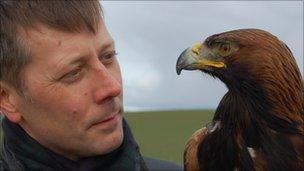Why kill Scottish birds of prey?
- Published

ģÉČËŋėĘÖ Scotland's David Miller investigated the deaths of rare protected birds in the Scottish countryside
The sight of a golden eagle soaring above Scotland's mountains can be the highlight of a day out in the Highlands.
The chance to catch a glimpse of a white-tailed sea eagle hunting, especially on the west coast where a sighting is rarer still, is likely to be an even more precious memory.
Scotland's biggest birds of prey embody the wild character of the nation's most remote mountains, lochs and glens.
They're also the focus of a fierce debate between sporting estates and gamekeepers on one hand and conservation organisations like RSPB Scotland on the other.
That's because every year birds of prey are found trapped, poisoned and shot on the country's hills, despite being protected by law and specialist wildlife crime officers.
I have seen the evidence at firsthand and it's a depressing picture.
But the scale of the problem is disputed.
Landowners say the number of illegal killings is relatively small. The official figures are between 25 and 30 each year.
The Royal Society for the Protection of Birds believes many other cases of raptor persecution go undiscovered and unreported.
So why would anyone want to kill a bird of prey?
The RSPB believes it's all about money.
Shooting, especially driven grouse shooting, is vital to the economy of rural Scotland. It's worth ÂĢ240m a year.
The owners of sporting estates argue that without careful land management, stocks of game birds - like red grouse - can be wiped out by predators.
Profits and jobs can be wiped out too.
Everyone involved in this debate condemns the illegal killing of birds of prey. That's where the agreement ends.
The Scottish Rural Property and Business Association (SRPBA), which represents many landowners, believes the Scottish government should allow gamekeepers to control the number of birds of prey.
The association is not calling for a large-scale cull of all raptors. Instead, it wants keepers to be allowed to control more common species, such as ravens and buzzards, in certain circumstances.
A poisoned buzzard, photographed by the RSPB
The Scottish government says it won't consider the licensed killing of birds of prey, while illegal persecution continues. That leaves open the possibility that, at some point in the future, licences could be granted.
It's a prospect that horrifies the RSPB, which has pledged to ensure the law continues to protect all of Scotland's birds of prey.
The two sides in this debate are at loggerheads, but there may be a glimmer of hope.
Research is being carried out in an attempt to find new ways to protect birds of prey while ensuring there are healthy stocks of game birds.
Feeding species like the hen harrier during the breeding season is seen as one possible way forward.
But diversionary feeding, as it's known, is seen by land managers as only part of the answer.
The financial stakes are high and the demands from sporting estates for a licensed cull of birds of prey in specific circumstances are likely to grow louder.
Fair Game? Scotland's Sporting Estates will be broadcast on ģÉČËŋėĘÖ Two Scotland at 2100 BST on May 11. The documentary will be available on iplayer shortly after transmission for those outside of Scotland.
- Published5 May 2011
- Published4 March 2011